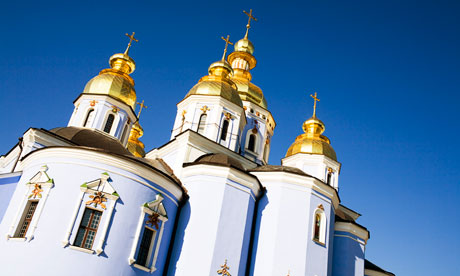
I was born in Ukraine and am quick to admit its social problems. But the country is more than the sum of its negative headlines
Euro 2012 is almost upon us. For those just joining us from outer space, it will take place in Poland and Ukraine – both first-time hosts. As an English-language writer who was born in Ukraine, I have been receiving messages from football fans who are having second thoughts about travelling to the country of my birth for the tournament. "I've got everything booked," one message reads. "But do you think Ukraine is safe for foreigners?"
In recent weeks, we have heard much talk about a boycott of Ukraine during the tournament – from such people as the foreign secretary, William Hague, and the German chancellor, Angela Merkel – inspired mainly by the jailing of the former prime minister, Yulia Tymoshenko, and furthered by general concerns over rule of law in the country. And since racist attacks in Ukraine are also not unheard of, the UK Foreign Office advises British travellers to Ukraine to "take extra care" if they are of Asian or African-Caribbean descent, or belonging to a religious minority group.
I've written extensively about other social problems and crime in Ukraine, including recent coverage of a horrific rape and murder that prompted mass protests in the country. You'd think I'd be the first to say, "Ukraine is not worth it." But I would be lying.
What intrigued me most about calls to boycott Euro 2012 in Ukraine was the fact that there was no high-profile drive to boycott the recent Eurovision song contest held in Azerbaijan – and it's not as if human rights abuses in Azerbaijan are something to speak of lightly. Azerbaijan is an authoritarian country, something that Ukraine is simply not (for one thing, Ukraine is too divided and diverse to be truly authoritarian). Did it come down to the fact that Azerbaijan has oil and Ukraine does not? Or is a major football tournament seen as a bigger deal than a few days of bad pop music? Either way, I have found myself feeling defensive over the implicit suggestion that Azerbaijan was perfectly fine to visit, while Ukraine is not.
As someone who comes to Ukraine often, and used to do so while accompanied by my Arab ex-boyfriend, I can personally attest to the fact that safety for foreigners in the country has improved. For one thing, racism in particular is no longer swept under the rug – there have been mass campaigns drawing attention to the problem, and a major drive to make skinheads feel unwelcome. Law-enforcement officials are keenly aware of the possibility of scandal. My source in the Ukrainian police told me this week: "People being picked up by the police for crimes are being told that should they cause any trouble during the tournament, there will be hell to pay. And officers themselves are being cautioned to think twice about harassing foreigners."
It may be that during Euro 2012, Ukraine will be a safer place for foreigners than for citizens. As a friend of mine who is a former prosecutor told me this week: "Some parents are worried that their children will fall prey to foreign sex-tourists during the tournament! As you can see, these kinds of safety concerns can go both ways. But Kiev is ready for the fans, the city is spruced up, and I think all will turn out well."
Ukraine is much more than the sum of the headlines. The football tradition there is long and proud, but even if you take sport out of the question, the country is well worth a visit. There is a well-developed eco-tourism industry in the west of the country, for example. And Kiev is a treasure trove of church architecture and shady courtyards, and does not yet have the sleek look and feel of the well-trod tourist destination.
As for me, I like to go down to the beach in Crimea's remote Lisya Bukhta, or Fox Bay, when given half the chance. A gathering place of hippies, nudists and other representatives of Ukraine's oft-neglected, yet thriving counter-culture movement, the scenic Lisya Bukhta represents, perhaps, what's best about the country today: a kind of fleeting informality, a point in space and time where day-to-day life remains unpredictable and very beautiful. And yes, I'm sure the bars down there will broadcast football matches live.
• Follow Comment is Free on Twitter @commentisfree Read More
انسخ الكود التالى و ضعه فى موقعك او مدونتك.
